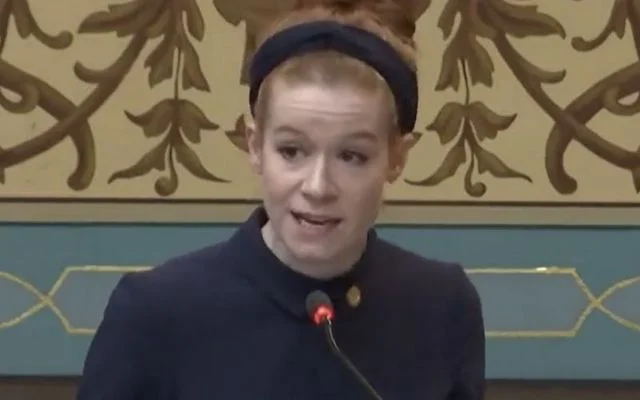I have watched Michigan State Senator Mallory McMorrow’s floor speech to her fellow senators at least five times. Initially I thought her comments were crafted for an audience of one: The colleague who publicly accused her of trying to “groom and sexualize” young children and to make them feel responsible for slavery. Sen. McMorrow certainly was speaking to her accuser, who was deserving of a good reprimand. She was undoubtedly also speaking directly to her colleagues who sat silent amidst the disgusting accusations made against her.
As I watched and re-watched, I was reminded of some outlandish accusations and commentary that I’ve heard right here in Newtown. I found myself making a mental list of all the people I hoped would come across the video of the Midwestern mom turned state senator who chose to answer, and not ignore, the lies and hate directed at her. Maybe they would hear her words and realize how misguided they’ve been. It wasn’t until my third or fourth viewing that I understood that Sen. McMorrow was also talking to me. She wanted me to hear her impassioned plea as much as she wanted her political adversaries to hear it. And if you are a white, straight, cis individual like me, someone who fits into your community seamlessly, who can be in public spaces without fear of discrimination, she’s talking to you too.
While it’s central to her message, I won’t delve into Sen. McMorrow’s statements about her faith (she’s a Christian) or how that faith molds her politics (she’s a Democrat). But I will admit to having proclaimed a hearty “Amen!” after first watching her speech, which was sermonesque in its wording and delivery. It was inspiring to hear both the passion and outrage in her voice as she spoke of her lifelong commitment to service and her determination to never “let hate win”. The young senator admonished those who support policies which further marginalize students based on race, sexual orientation, religion, or gender identity; policies that dehumanize them for the simple act of being who they are. She described such legislation as being unchristian and hateful.
There is a long, ugly history in our country of dehumanizing BIPOC. Without it, no slave-owner could have whipped a Black man’s body or torn a Black baby out of his inconsolable mother’s arms. Without it, we would likely have a much larger indigenous population. That kind of cruelty is only possible if the targeted demographic is seen as animal-like and not as fellow human beings. Dehumanizing happens today as well, helping to account for violence against Black bodies by white police or self-appointed neighborhood vigilantes. If you have bought into the narrative that Black people are violent, that they don’t belong in your neighborhood, that they are criminals—then you no longer see them as someone like you. You see them as other. As less-than. As a threat.
Those who perceive Diversity, Equity, and Inclusion (DEI) as a threat to their communities often resort to comparable tactics, such as name-calling and labeling. They characterize DEI advocates as being “woke”, Marxists, and destroyers of America. They say we are guilty of reverse racism, that we hate white people, hate white men, want white children to feel sad or guilty or lose their sense of patriotism or (gasp!) become Democrats. Who in their right mind would want to associate with these anti-American, godless, reverse-racists?
Newtown residents of color are made to feel less-than in a myriad of ways as they navigate our predominantly white spaces. Take, for example, the way that so much of their ancestor’s history isn’t even mentioned in history lessons or how the ugly stuff is conveniently ignored. We can’t pretend that the US didn’t drop atomic bombs on Hiroshima and Nagasaki. We can’t wish away slavery. Those things happened. How little faith one must have in their country and their children to fear the teaching of accurate history in schools! White children will not feel bad about being white if they learn about slavery and redlining and the Tulsa Massacre. But they will take that knowledge with them as they head out into our world. They won’t be able to change what’s already happened, but they will, as Sen. McMorrow said, share in the “responsibility for writing the next chapter of history.”
Sen. McMorrow referred to herself as her opponents’ “biggest threat”. She reasoned that if she (a parent) stands up against policies that target already-marginalized children, then her opponents can’t use buzz words like “parental rights” as a cover to enact them. And guess what, Newtown? Those who don’t want their kids to learn about the experience of Black America, or don’t want them to read literature written by a diversity of voices, or don’t think it’s important to have an ethnically and racially diverse teaching staff…. well, they need to hear from white people who disagree with them. The senator said that she wants every child in her state to feel “seen, heard, and supported,” and that it would take “people like me” to make that happen. The plain fact is that we have no business calling ourselves “allies” if we aren’t willing to step outside our comfort zones, even risk demonization, and let those children who are the targets of hate in Newtown know that they are seen, heard, and supported–and that their community has their backs.

Wendy,
Thank you for an outstanding piece of writing. You hit on every important point in dealing with diversity, inclusion and equity. We can’t ignore the US past and yes, the horrible things that were done; Japanese internment camps, broken treaties with Native Americans, and multiple atrocities that we should never repeat.